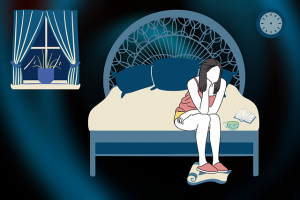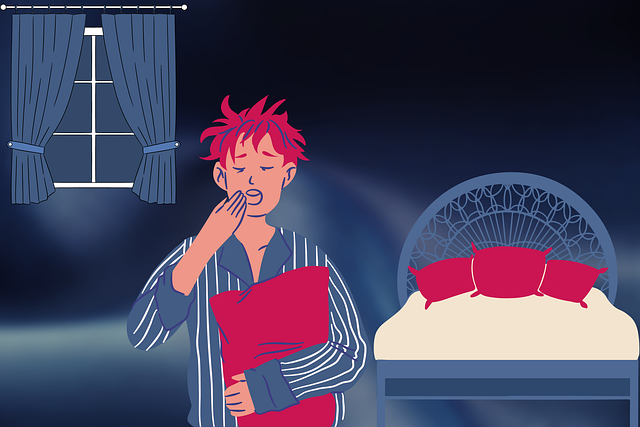Insomnia is a sleep disorder that affects millions of people worldwide. It is characterized by difficulty falling asleep, staying asleep, or waking up too early and not being able to go back to sleep. Insomnia can be acute, lasting a few days or weeks, or chronic, lasting for months or even years. It can have a significant impact on a person’s quality of life, affecting their mood, energy levels, and ability to function during the day.
According to the American Sleep Association, approximately 30% of adults in the United States experience symptoms of insomnia. Women are more likely than men to suffer from insomnia, and older adults are more likely than younger adults to experience sleep disturbances. Insomnia can occur at any age and can be caused by a variety of factors.
It is essential to treat insomnia because it can lead to other health problems such as depression, anxiety, and chronic pain. Lack of sleep can also impair cognitive function and increase the risk of accidents and injuries.
Causes of Insomnia
 Stress and anxiety are common causes of insomnia. When we are stressed or anxious, our bodies produce cortisol, a hormone that increases alertness and makes it difficult to fall asleep. Chronic stress can lead to long-term sleep disturbances.
Stress and anxiety are common causes of insomnia. When we are stressed or anxious, our bodies produce cortisol, a hormone that increases alertness and makes it difficult to fall asleep. Chronic stress can lead to long-term sleep disturbances.
Medical conditions such as chronic pain, asthma, and acid reflux can also cause insomnia. These conditions can make it difficult to get comfortable in bed or cause discomfort that wakes you up during the night.
Certain medications such as antidepressants, stimulants, and beta-blockers can interfere with sleep. If you are taking medication and experiencing sleep disturbances, talk to your doctor about adjusting your dosage or switching to a different medication.
Lifestyle factors such as caffeine consumption, alcohol use, and irregular sleep patterns can also contribute to insomnia. Consuming caffeine late in the day or drinking alcohol before bed can disrupt sleep. Irregular sleep patterns such as staying up late on weekends can also make it difficult to fall asleep and wake up at the same time every day.
Counting Sheep: Is It Really Effective?
Counting sheep is a popular method for falling asleep. The idea is to visualize a flock of sheep jumping over a fence, counting each one as it passes. The repetitive nature of this exercise is thought to help calm the mind and promote relaxation.
Research on the effectiveness of counting sheep is mixed. Some studies have found that it can be helpful for people with mild insomnia, while others have found no significant benefit. One study found that participants who counted sheep took longer to fall asleep than those who did not engage in any specific activity.
Alternative methods for falling asleep include relaxation techniques such as progressive muscle relaxation and deep breathing exercises. These techniques can help calm the mind and promote relaxation, making it easier to fall asleep. Other methods include aromatherapy, sleep hygiene practices, and cognitive-behavioral therapy.
10 Natural Remedies for Insomnia
1. Exercise: Regular exercise can improve sleep quality by reducing stress and anxiety and promoting relaxation. Recommended types of exercise for better sleep include yoga, tai chi, and low-impact aerobic exercise.
2. Diet: Avoid consuming caffeine, alcohol, and heavy meals before bedtime. Foods that promote sleep include warm milk, bananas, and whole-grain crackers.
3. Herbal Remedies: Chamomile tea, valerian root, and lavender oil are natural remedies that can promote relaxation and improve sleep quality.
4. Relaxation Techniques: Progressive muscle relaxation, deep breathing exercises, and yoga can help calm the mind and promote relaxation.
5. Aromatherapy: Essential oils such as lavender, chamomile, and bergamot can promote relaxation and improve sleep quality when used in a diffuser or applied topically.
6. Sleep Hygiene: Creating a sleep-conducive environment by keeping the bedroom cool, dark, and quiet can improve sleep quality. Establishing a bedtime routine can also help signal to the body that it is time to sleep.
7. Cognitive Behavioral Therapy: CBT for insomnia is a type of therapy that helps identify and change negative thought patterns and behaviors that contribute to sleep disturbances. It has been shown to be effective in treating chronic insomnia.
8. Acupuncture: Acupuncture can improve sleep quality by promoting relaxation and reducing stress and anxiety. Research has shown that acupuncture can be an effective treatment for insomnia.
9. Massage Therapy: Massage therapy can promote relaxation and reduce muscle tension, making it easier to fall asleep. Types of massage therapy for better sleep include Swedish massage, deep tissue massage, and reflexology.
10. Mindfulness Meditation: Mindfulness meditation involves focusing on the present moment and letting go of distracting thoughts. Research has shown that mindfulness meditation can improve sleep quality and reduce symptoms of insomnia.
Insomnia is a common sleep disorder that can have a significant impact on a person’s quality of life. While medication is available to treat insomnia, natural remedies such as exercise, diet, herbal remedies, relaxation techniques, aromatherapy, sleep hygiene practices, cognitive-behavioral therapy, acupuncture, massage therapy, and mindfulness meditation can also be effective.
It is essential to seek professional help for chronic insomnia as it can lead to other health problems such as depression and anxiety. However, trying natural remedies for better sleep can be a safe and effective way to improve sleep quality without the use of medication. With the right combination of natural remedies and lifestyle changes, it is possible to overcome insomnia and get the restful sleep you need to feel your best.









